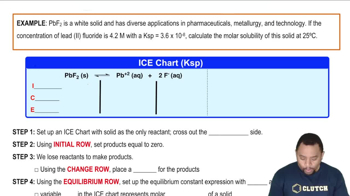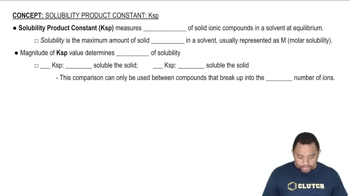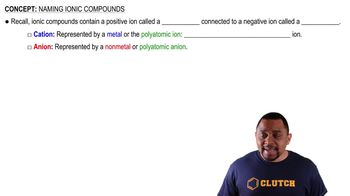Write balanced equations and expressions for Ksp for the dissolution of each ionic compound. b. PbBr2
Ch.18 - Aqueous Ionic Equilibrium

Chapter 18, Problem 95a
Use the given molar solubilities in pure water to calculate Ksp for each compound. a. MX; molar solubility = 3.27⨉10-11 M
 Verified step by step guidance
Verified step by step guidance1
Identify the dissolution equation for the compound MX: MX(s) \rightleftharpoons M^+(aq) + X^-(aq).
Recognize that the molar solubility of MX is given as 3.27 \times 10^{-11} M, which means [M^+] = [X^-] = 3.27 \times 10^{-11} M at equilibrium.
Write the expression for the solubility product constant (K_{sp}): K_{sp} = [M^+][X^-].
Substitute the equilibrium concentrations into the K_{sp} expression: K_{sp} = (3.27 \times 10^{-11})(3.27 \times 10^{-11}).
Calculate the K_{sp} value by multiplying the concentrations.

Verified video answer for a similar problem:
This video solution was recommended by our tutors as helpful for the problem above.
Video duration:
2mWas this helpful?
Key Concepts
Here are the essential concepts you must grasp in order to answer the question correctly.
Molar Solubility
Molar solubility is the number of moles of a solute that can dissolve in a liter of solvent at a given temperature, expressed in moles per liter (M). It provides a quantitative measure of how much of a compound can dissolve to form a saturated solution. Understanding molar solubility is essential for calculating the solubility product constant (Ksp) of ionic compounds.
Recommended video:
Guided course

Molar Solubility Example
Solubility Product Constant (Ksp)
The solubility product constant (Ksp) is an equilibrium constant that reflects the extent to which a sparingly soluble ionic compound dissolves in water. It is calculated from the concentrations of the ions in a saturated solution, raised to the power of their coefficients in the balanced dissolution equation. Ksp values are crucial for predicting the solubility of compounds and understanding precipitation reactions.
Recommended video:
Guided course

Solubility Product Constant
Dissociation of Ionic Compounds
When ionic compounds dissolve in water, they dissociate into their constituent ions. For example, a compound MX will dissociate into M⁺ and X⁻ ions. The stoichiometry of this dissociation is important for calculating Ksp, as the concentrations of the ions produced directly influence the Ksp value. Understanding this process is vital for accurately determining the solubility product from molar solubility.
Recommended video:
Guided course

Ionic Compounds Naming
Related Practice
Textbook Question
Textbook Question
Write balanced equations and expressions for Ksp for the dissolution of each ionic compound. c. Ag2CrO4
Textbook Question
Refer to the Ksp values in Table 18.2 to calculate the molar solubility of each compound in pure water. a. AgBr
Textbook Question
Use the given molar solubilities in pure water to calculate Ksp for each compound. b. PbF2; molar solubility = 5.63⨉10-3 M c. MgF2; molar solubility = 2.65⨉10-4 M
Textbook Question
Use the given molar solubilities in pure water to calculate Ksp for each compound. a. BaCrO4; molar solubility = 1.08⨉10-5 M
Textbook Question
Use the given molar solubilities in pure water to calculate Ksp for each compound. b. Ag2SO3; molar solubility = 1.55⨉10-5 M c. Pd(SCN)2; molar solubility = 2.22⨉10-8 M
